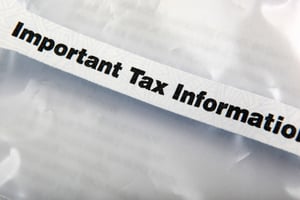 As tax time rolls around each year we all start getting the necessary documents for proper filing of our taxes. You're not alone if you find all of these important forms a little confusing! Besides the W-2 which is used to report wages, form 1099 is widely used for a variety of purposes. Here are the basics you need to know about this multi-functional form.
As tax time rolls around each year we all start getting the necessary documents for proper filing of our taxes. You're not alone if you find all of these important forms a little confusing! Besides the W-2 which is used to report wages, form 1099 is widely used for a variety of purposes. Here are the basics you need to know about this multi-functional form.
What is a 1099? Very simply - the 1099 is used to file information with the IRS regarding non-salary income. There are different types of 1099's used to report the various types of income that you may receive. For each 1099 one copy will be sent to the IRS and one copy will be sent to you.
Who gets a 1099? If you are an independent contractor or a business owner you will receive 1099's from anyone who paid you more than $600 in the past tax year. You could also have earnings from other sources such as interest, dividends, government payments*, sale of property, or even debt forgiveness.
*If you received a stimulus payment in 2020, we will point out that this was not considered taxable income, but rather, an advance payment of a tax credit.
Receiving the 1099 does not automatically mean that the payee owes taxes. There could be situations that offset the earnings, but it definitely means that the IRS has a record of that payment.
When will I get my 1099's? In most cases the institution is required to have forms 1099 postmarked by January 31. If you receive your documents in the mail it could take a week or more after this for delivery. If you receive documentation by email, the forms should be available online on the 31st or 1st.
There are a few types of 1099 which must be delivered by February 16, 2021. In these cases because of the complexity of the information being reported, the extra two weeks gives companies time to be sure they have accurate information resulting in fewer corrections. Correction cycles will begin as needed after the February date.
Most common types of Form 1099 Here's a list of the most common types of 1099 that our clients receive along with a description of their purpose.
- 1099-NEC This form is new for 2020 and is used for non-employee compensation
- 1099-DIV Reports dividends paid from an investment account
- 1099-INT Interest income
- 1099-Misc Miscellaneous income such as rent and royalty payments
- 1099-Q Payments from education accounts such as 529's
- 1099-R Distributions from pensions, annuities, retirement or Profit-Sharing Plans, IRAs, insurance contracts, etc.*
- 1099-SA Payments from HSA accounts
- 1099-Consolidated For your convenience this form is used to deliver several types of 1099 including 1099-DIV, 1099-B, 1099-INT, 1099-MISC, and 1099-OID.
*If you completed a rollover from a 401(k) or other employee-sponsored plan in 2020 you will receive a 1099, but this is not necessarily taxable income. Box 2A will be used to indicate the "taxable amount" for this distribution. Before you get too concerned about getting a 1099 incorrectly, notice the taxable amount.
Be sure to save all of the tax forms you receive. Some of them may not need to be filed with your tax return, but there are exceptions. We recommend that you take all of your tax documents to your tax preparation meeting and let the expert guide you as to next steps.
Please give us a call if you need assistance locating the 1099 forms for your investment accounts managed by Creekmur Wealth Advisors.

